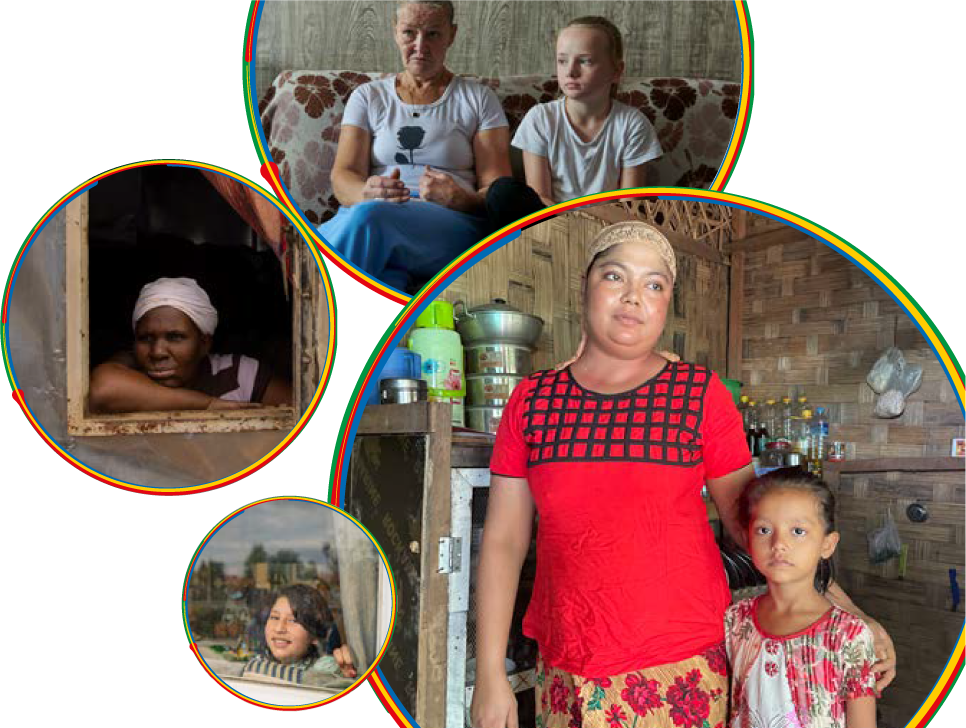What is Statelessness?
Today millions of people around the world are denied a nationality.
As a result, they often aren’t allowed to go to school, see a doctor, get a job, open a bank account, buy a house or even get married. Stateless people may have difficulty accessing basic rights such as education, healthcare, employment and freedom of movement. Without these things, they can face a lifetime of obstacles and isolation.

What is Statelessness?
Today millions of people around the world are denied a nationality.
As a result, they often aren’t allowed to go to school, see a doctor, get a job, open a bank account, buy a house or even get married. Stateless people may have difficulty accessing basic rights such as education, healthcare, employment and freedom of movement. Without these things, they can face a lifetime of obstacles and isolation.
The international legal definition of a stateless person is “a person who is not considered as a national by any State under the operation of its law”. In simple terms, this means that a stateless person does not have the nationality of any country.
Some people are born stateless, but others become stateless. Stateless people are found in all regions of the world. The majority of stateless people were born in the countries in which they have lived their entire lives.
Statelessness often has a severe and lifelong impact on those it affects. The millions of people around the world who are denied a nationality often fight for the same basic human rights that most of us take for granted. Often they are excluded from cradle to grave— being denied a legal identity when they are born, access to education, health care, marriage and job opportunities during their lifetime and even the dignity of an official burial and a death certificate when they die. Many pass on statelessness to their children, who then pass it on to the next generation.
People usually acquire a nationality automatically at birth, either through their parents or the country in which they were born. However, one or more of the following factors can give rise to statelessness:
- A significant cause of statelessness is discrimination on the basis of race, ethnicity, religion, language or gender. Non-inclusion of specific groups in the body of citizens for discriminatory reasons is linked to protracted and large-scale statelessness in the country of birth. States can also deprive citizens of their nationality through changes in law using discriminatory criteria that leave whole populations stateless. In fact, the majority of the world’s known stateless populations belong to minority groups. Gender discrimination in nationality laws is a significant cause of childhood statelessness. The laws in 24 countries do not let women pass on their nationality on an equal basis with men. Consequently, children can be left stateless when they cannot access their father’s nationality for a variety of reasons, such as if their fathers are stateless, unknown, missing, deceased or otherwise unable or unwilling to confer their nationality.
- Gaps in nationality laws are a significant determinant of statelessness. Every country has laws which establish the circumstances under which someone acquires nationality or can have it withdrawn. If these laws are not carefully drafted and correctly applied, some people can be excluded and left stateless. An example is children who are of unknown parentage in a country where nationality is acquired based on descent from a national. Fortunately, most nationality laws recognize them as nationals of the state in which they are found.
- When people move from the countries where they were born, conflict of nationality laws can give rise to the risk of statelessness. For example, a child born in a foreign country can risk becoming stateless if that country does not permit nationality based on birth alone and if the country of origin does not allow a parent to pass on nationality to children born abroad.
- Another important reason is the emergence of new states and changes in borders. In many cases, specific groups can be left without a nationality and, even where new countries allow nationality for all, ethnic, racial and religious minorities frequently have trouble proving their link to the country. In countries where nationality is only acquired by descent from a national, statelessness will be passed on to the next generation.
- Statelessness can also be caused by loss or deprivation of nationality. In some countries, citizens can lose their nationality simply from having lived outside their country for a long period of time.
- Individuals may be at risk of statelessness if they cannot prove that they have links to a State. Being undocumented is not the same as being stateless. However, lack of birth registration can put people at risk of statelessness as a birth certificate provides proof of where a person was born and parentage – key information needed to establish a nationality.
Governments establish who their nationals are. This makes them responsible for legal and policy reforms that are necessary to effectively address statelessness. At the same time, the discretion of States with regard to nationality is limited by obligations under international treaties to which they are party, customary international law and general principles of law. In addition, UNHCR, other agencies, inter-governmental organizations, civil society and stateless people all have roles to play in supporting the efforts of governments.